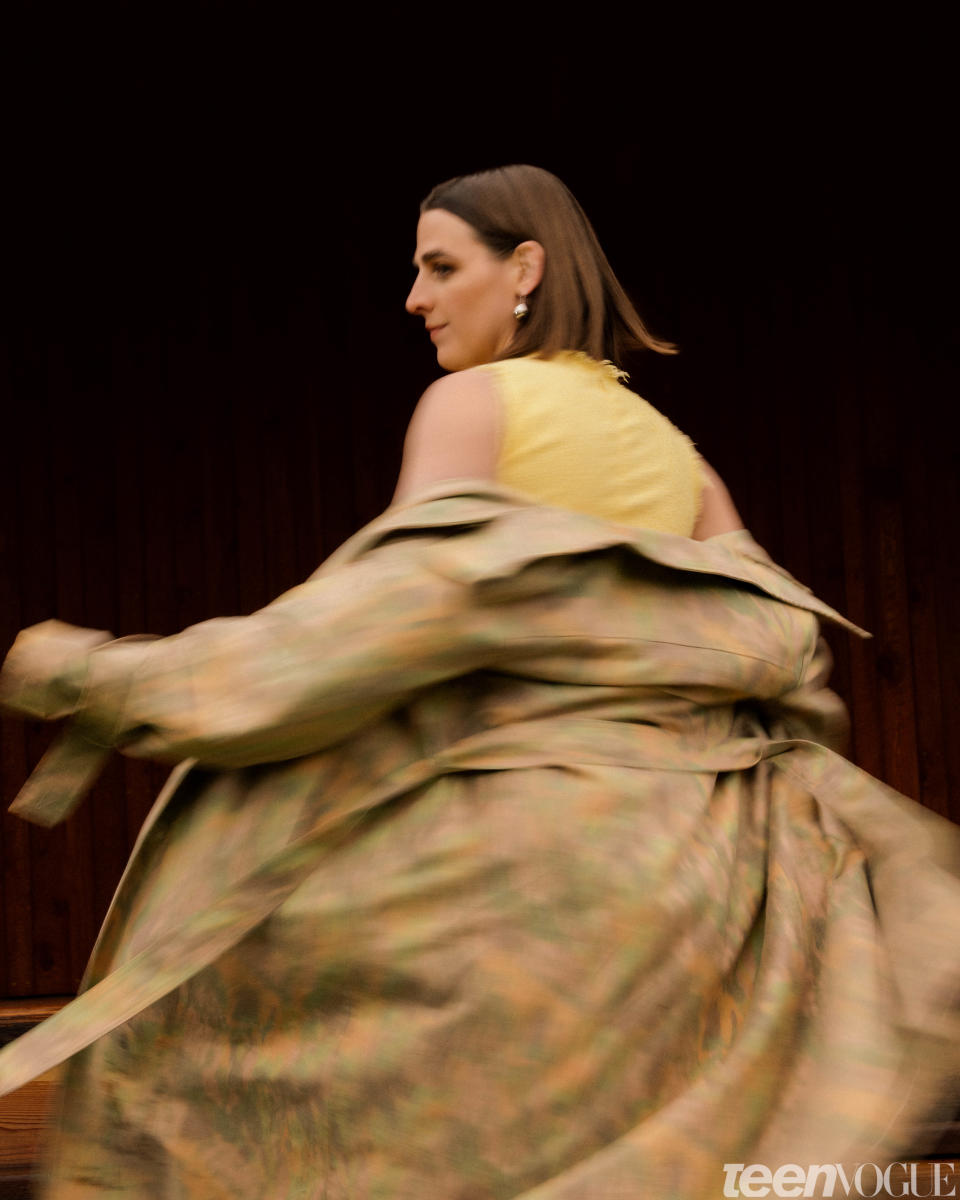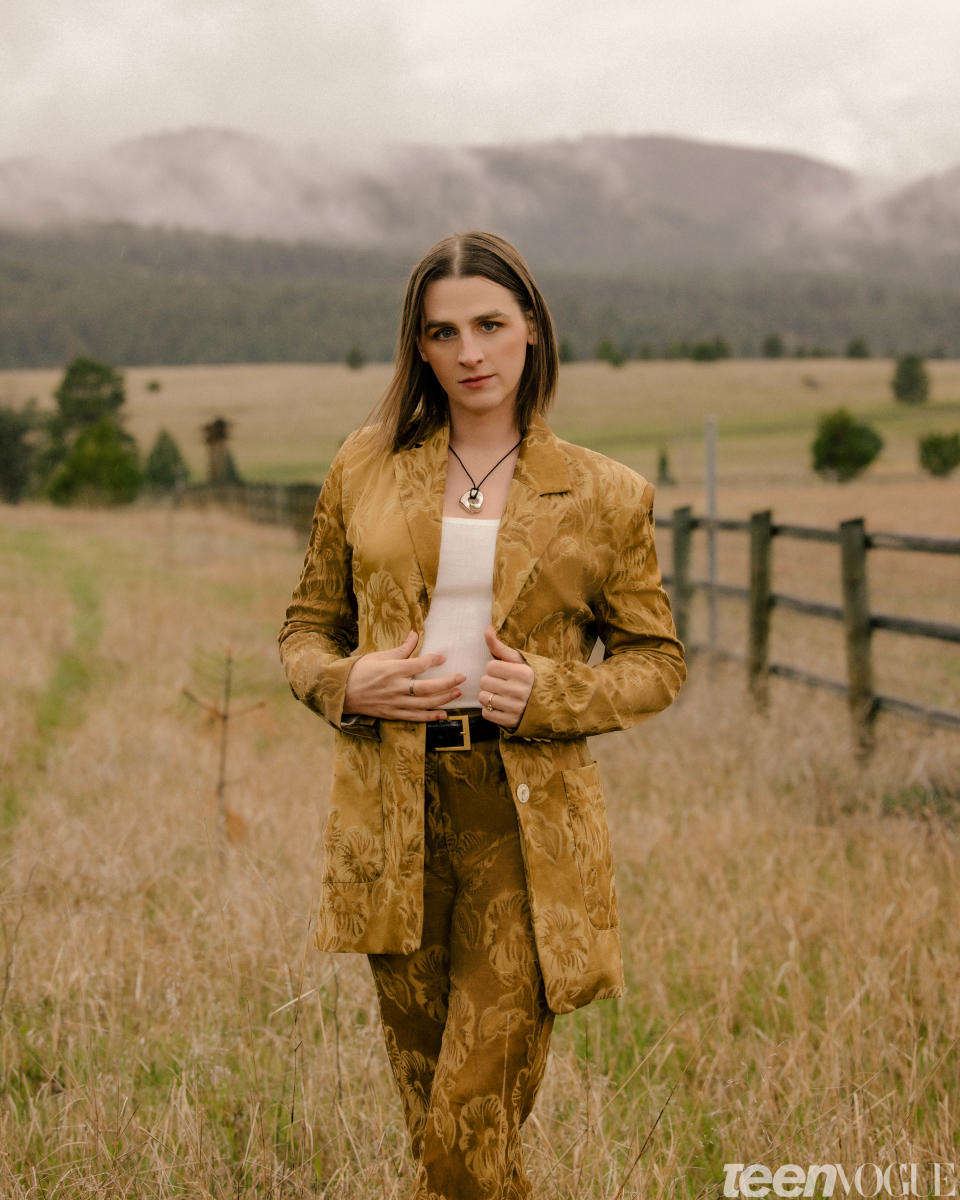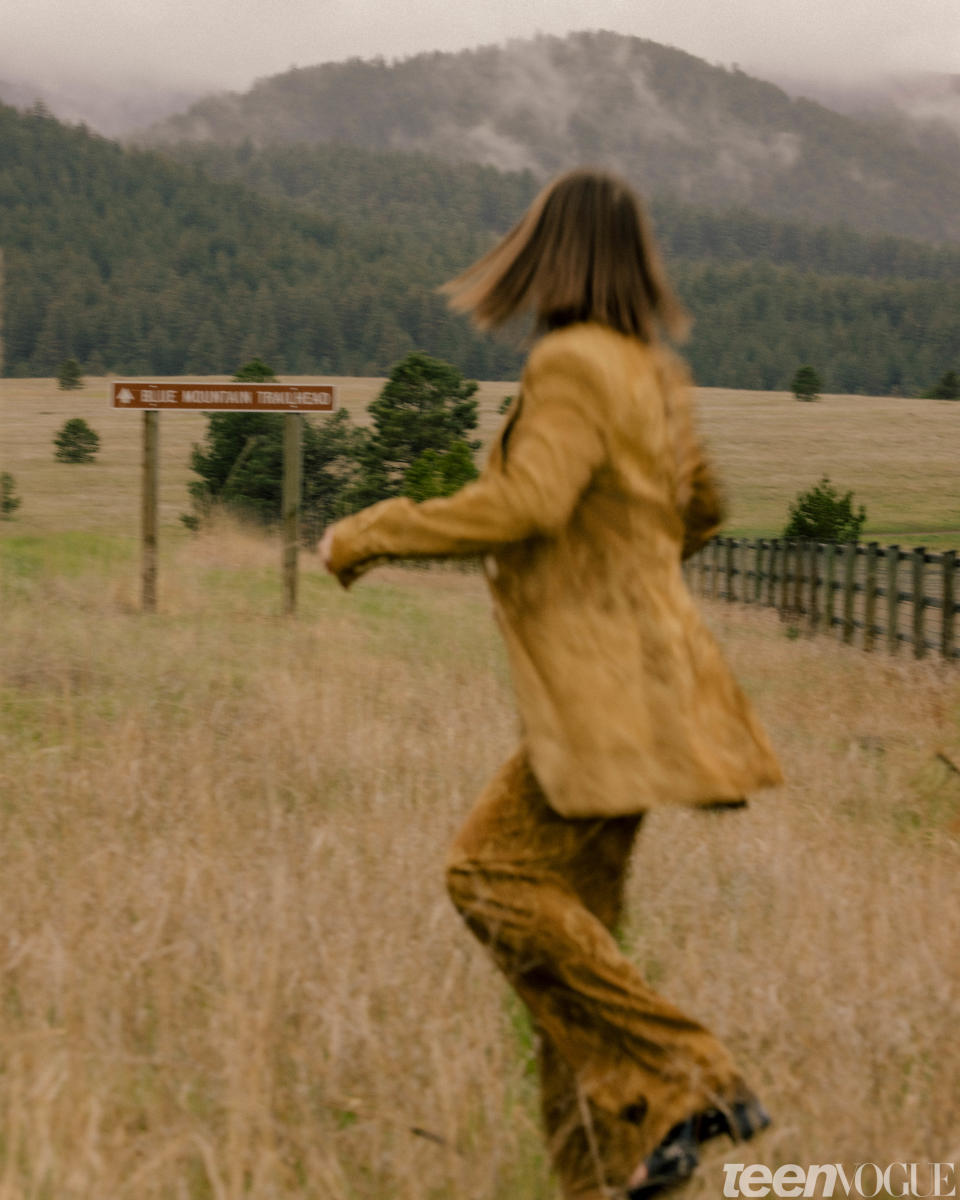Zooey Zephyr Wants to Do Right by Montana

Rebecca Stumpf
Montana has the privilege of being the Big Sky state and indeed, upon landing in the little valley housing the Missoula airport, I could see more sky than ever before. State Rep. Zooey Zephyr’s story is as much about Missoula as anything else, so let’s start there. The small, liberal oasis, with a population estimated at over 77,000 in 2023, is nestled in the mountains, carved in two by a mighty river.
This is a land where people want to do right and have others do right by them. I wasn’t sure what to expect. I grew up in the Midwest, a Hoosier by birth, but I’ve lived in New York for the past seven years. Everyone I meet during my trip looks me in the eye and speaks to me with respect — not something you can say about the streets of Manhattan, even if it can be a kinder place than most people give it credit for. Surely the way I was treated in Montana has something to do with the fact I was trailing the most famous trans woman in Missoula.
As any reporter who’s made the pilgrimage to meet Zephyr might tell you, everywhere we went, someone came up to pay their respects to the 36-year-old Montana state legislator. She freely gave away her email and phone number and promised to try and make plays, chess tournaments, and charity events despite her busy schedule.


Elected in 2022, in her first session in office, Zephyr, a Democrat, caught notice for the simple act of representing her constituents. Last spring, she advocated against Senate Bill 99, a disastrous piece of legislation banning gender-affirming medical and surgical care for children. On the state house floor, Zephyr was denied the chance to speak. Later on, a protest erupted and she held her mic up in defiance and subsequently was formally censured by her Republican colleagues. She spent the rest of the session away from the legislative floor, doing what work she could do online from a bench in the same building. (The bill passed and was signed into law by Montana’s Republican governor Greg Gianforte, but was temporarily blocked by the courts for violating the right to privacy enshrined in the state's constitution.)
“The idea that a party in power in the legislature could disallow comment from legislators in the minority for any reason whatsoever is a harrowing indictment of the state of democracy in the country,” she told me a year after the blowup. People didn’t just come out the day of that protest to support trans rights, Zephyr is careful to note, but also to point out that the censure was “fundamentally undemocratic.”
I know she’s been asked about this a million times: Her take, her stance, her feelings as a trans woman with an immense platform who has faced such intense scrutiny and censorship. “Sorry if you were hoping for a…” Zephyr trails off. There’s no sob story here.
Certainly, there have been lows and highs during her time as a legislator. Her family has been SWATTed, yet she’s spoken at the World Forum for Democracy — the only American politician invited in 2023. She was to have spoken alongside Mohamed Al Jaja, a Palestinian journalist, but he was killed in a strike on his home along with his wife and children.
The nature of good and evil has been on Zephyr’s mind lately. As we walk around town she continually brings up what it means to do good. Dungeons & Dragons is a central metaphor; Zephyr is an avid player. When we meet at her apartment she is in the middle of painting game figurines. Storytelling is a lens to tackle larger questions about what it means to do right in tangible ways. In college, she originally studied literature and admired the work of Carmen Maria Machado and Sarah Manguso. She even cowrote a children’s book that helped explain multiple sclerosis to children.

“I have optimism. I have a belief that change is possible. I have a belief that this country is worth fighting for, that my state is worth fighting for.”
“I try to wrestle with complex questions through my characters,” Zephyr says. It’s a place, she tells me, where one can explore gender, politics, and ethics, and learn the value of third spaces. It’s also, paradoxically, a way to take a break from those more complex issues. “We get to try to stop [evil.] You get to feel like a hero. Many times, there’s a [villain] and I can go smack it with magic or a hammer. That can be cathartic.” Painting figurines is something no one can take away, a finished product worth admiring, unlike a law that must be debated, shaped, and fought for; something that could — under a different government — vanish.
“Queerness in Montana is something that is about persistence and visibility,” says Kal Aksamit, a student at the University of Montana. Aksamit, who started taking testosterone (T) before college, tells me, “I was the first trans person in my high school.” Bathroom stress was always an issue. In a small school, many laughed, or told Aksamit he was “such a pretty girl.” Aksamit sang in the school choir anyway and performed a song from The Hunchback of Notre Dame, changing the lyrics to reflect his own experience.
Now Aksamit studies voice therapy and its intersection with trans people. Another friend has just started estrogen. Both of them access medical services at the University of Montana, which also helps beginners with their hormone injections for no additional fee. There’s a small but solid LGBTQ community in Missoula, too. While there isn’t a dedicated queer or trans bar, most of the college kids looking for a good time go to shows or pop-up events at DIY spaces like Freecycles, where we met during an event for Zephyr.
That isn’t to say life isn’t without challenges. Aksamit knows that access to health care and other basic rights could be lost under slightly more conservative leadership.
The infrastructure of Missoula, like many cities across America, is crumbling. Homeownership is on the decline and renters are getting priced out of the liberal college town. An encampment of unhoused people used to sit along the river.
Zephyr has had to move since getting elected. Her focus on tenant protections and infrastructure repairs in the city has often been downplayed by mainstream media. It’s not as sexy or controversial an angle as trans rights — but making a town livable is no less important in Zephyr’s eyes. Just last year she introduced HB 785, which adjusted parts of the state’s Residential Landlord-Tenant Act, first drafted in 1977, because she says it's due for an overhaul.



“Service industry workers have been canaries in the coal mine for a decade,” she tells me over tacos. “Why is a single-family home in Bozeman a million dollars? And what is this homelessness crisis we’re experiencing?” Short-term rentals like Air BnB and soaring property tax bills don’t help. “You watch [this] eat away at the communal fabric of a city.” Homeownership is out of reach for many. Even if a magic bullet policy comes, it may be too late for many who will remain in the renting class.
“[Landlords have] come in[to legislative office] and they’ve moved the needle [in their favor] more and more. In this last legislative session, I watched someone come in and argue against emotional support animals [by saying] that maybe it could diminish future investment value of a property,” Zephyr says, with palpable disdain in her voice. This bill made it easier to reject prospective tenants with service animals. Just another way, Zephyr argues, the legislature has served landlords instead of tenants.
At the end of April, Zephyr received the Jeannette Rankin Peacemaker of the Year Award, named for the first woman to hold federal office in the United States. (Montana was the 10th state to grant women the right to vote.)

The winner is given a beautiful handmade quilt and accepted into a long lineage of changemakers. The event took place at Freecycles, the DIY space in town where I met Aksamit. There were plenty of baked goods and older women willing to talk to me about how they ended up in Montana. One woman brought her trans child to meet the legislator.
Friends, professors, and Montana senator Andrea Olsen all introduced Zephyr before she took the stage wearing a simple dress. “By now her story is very well known and I don’t have to go into that,” Olson joked, “but I’d be happy to.”
Zephyr's story is yoked to her, present wherever she goes. She must constantly explain herself and also rise above the petty derision of some of her fellow legislators. When she answers a question she is clear, precise, and obviously media-trained. She does not miss a beat or respond to any of the wink-wink, nudge-nudging that might rattle other politicians of her stature.
In her award acceptance speech, she mentioned “the ongoing genocide in Gaza.” She spoke about the hope for peace and a recent reconciliation dinner she had with her parents. “I think about the way peace requires us to commune with people who hold antithetical beliefs to us in kind, genuine, and delicate ways.” She told us that she tries to approach every conversation with three things in mind: “First of which is that the person I'm talking to came to their beliefs genuinely. The second is that they hold beliefs that were nuanced. And the third is that they are willing to change their mind under the right circumstances. That is not true of everyone. That is particularly not true of everyone in politics. But I believe that about my opinions.”
Zephyr gives an example of a conservative legislator whom she began to befriend, arms down, ready to listen. They swapped stories about their family heirlooms. This lawmaker, she says, was planning to propose a few transphobic bills. One day, the woman asked if she had a second to “talk about trans stuff.” Instead of scurrying away, Zephyr said, “Yep, absolutely.” They stood in front of the Capitol along with a trans lobbyist and talked about their lives as trans people and their desire for dignity. When that legislator came back in on Monday, she said she had prayed about it: “I want to do right by you. I’m not gonna run those bills.”
Yielding, Zephyr says, is not an option. “I believe that radical action is required. I'm proud of every disrupter in this state who has made it hell for those who will not call for a ceasefire. I am proud of the people who are standing up on college campuses fighting for what they believe.” At the end of Zephyr’s speech, one woman screamed from the audience, “Free Palestine.”
“If we cannot get to a better place in this country, I still believe fighting in the halls of power and voting and people who are willing to fight for you is more akin to inflating lifeboats.”


We’d been waiting for an encampment to form at the University of Montana. None had by the time I left, even though only a week or two before, the encampments were spreading in numbers. Over the weekend of my visit, we talked incessantly about Palestine and those on the left who are considering not voting or, where they are able, would be voting “undecided” or “uninstructed” later this year in the presidential race.
“Do you have faith in the system?” I ask. “I have optimism,” Zephyr replies. “I have a belief that change is possible. I have a belief that this country is worth fighting for, that my state is worth fighting for.”
She sees a multipronged approach as most effective: “I believe that the fight for change requires us to both take radical action, like protesting at a university and disrupting your legislators who are not calling for a ceasefire. And it also requires quiet needle-moving behind the scenes. And I don't think either of those is sufficient. I don't think a US senator changes their stance because I call them [and] I don't think someone disrupting a fundraiser is going to make a person ever change their mind.”
For Zephyr, part of the question means choosing the ground on which the fight takes place, i.e., Biden as opposed to Trump: “We vote for the framework in which the fight takes place.” I ask what she thinks of those who’d argue there’s no difference under a crumbling system. “Trans people fleeing from one state to another know the difference,” she says. “I believe that we can get to a point where America upholds the ideals that it purports to have. But if it's all going up, if we cannot get to a better place in this country, I still believe fighting in the halls of power and voting and people who are willing to fight for you is more akin to inflating lifeboats. Even if we could not fix the prison system, even if we could not adequately address the housing crisis, we can try to save people.”


Zephyr was in the middle of planning a wedding when I arrived. One afternoon she swung from a discussion about Palestine to a meeting about wedding china. When I spoke about Zephyr to friends, inevitably some knew about the powerhouse political couple’s other half, Erin Reed, a journalist and trans woman with a large following on X who reports on anti-trans politics, rhetoric, and violence. They are, without a doubt, lesbian T4T royalty.
The couple originally met while working on similar issues. One day Reed asked Zephyr how her weekend was. “Then she did a little hair brush behind her ear and I realized, she likes me.” Zephyr met Reed’s son and the two embarked on a long-distance relationship. Later, she whispered “I’m going to marry you someday,” into Reed’s ear while Sam Smith sang at the Respect for Marriage Act signing. “She has a deep, deep, deep kindness and a drive to follow the things that she loves,” Zephyr says of Reed. The two shared frequent calls and check-ins during the weekend I spent with the legislator. Zephyr often cooed encouraging words to her son.
Beyond her wedding, the next year will be big for Zephyr. She’s running for re-election and Montana is in the middle of redistricting. She’s involved with Stop KOSA, a campaign to stop a congressional bill that critics say could limit online access to LGBTQ resources. She’s speaking out about the Heritage Foundation’s Project 2025 plan to concentrate extraordinary power in a potential Republican president’s hands. Zephyr doesn’t have an exact political plan beyond the next year she’s willing to share but she doesn’t seem worried about her current election. Like any good D&D campaign, such long-term vision requires strategy, patience, and going where the need is greatest.
Still, Zephyr tells me that after her appearance on The View, Whoopi Goldberg herself told the state representative she hoped to one day vote for the Montana native on the national stage. Only time will tell where the politician will feel her time is best served.

Photo Credits
Photographer Rebecca Stumpf
Lighting Tech Harvey Schwier
Digitech Anna Smidt
Retouching Ariel Brigmann-Laspiñas
Stylist Kat Thomas
Hair & Makeup Artist Rachel Rockwood
Manicurist Sky Lopez
Production Assistant Aaron Agosto
Florals Field Five Flowers
Backdrop Goldy Way
Design Director Emily Zirimis
Designer & Production Liz Coulbourn
Associate Visuals Editor Bea Oyster
Editorial Credits
Editor-in-Chief Versha Sharma
Executive Editor Dani Kwateng
Politics Director Allegra Kirkland
News & Politics Editor Lex McMenamin
Contributing Editor Alyssa Hardy
Associate Director of Audience Development and Analytics Mandy Velez Tatti
Sr. Social Media Manager Honestine Fraser
Social Media Manager Jillian Selzer
Copy Editor Leslie Lipton
Research Editor Joseph Frischmuth
Writer Grace Byron
Stay up-to-date with the politics team. Sign up for the Teen Vogue Take
Originally Appeared on Teen Vogue
News and Politics: Mid Hero


